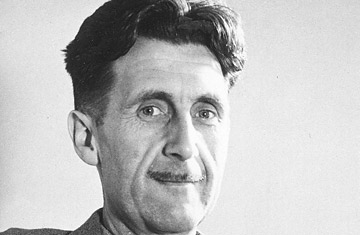
George Orwell
"To see what is in front of one's nose needs a constant struggle," noted George Orwell in a weekly newspaper column in 1946. To help him keep focused, the author of Animal Farm and 1984 kept a diary in which he recorded everything from how many eggs his chickens laid to his political observations on the rise of communism in Europe. From Aug. 9, the Orwell Prize, an annual award for political writing set up by admirers and old friends, will make some of those diaries available online — but not all Orwell fans are happy about it.
The diaries will be published as a sort of a blog, with entries added daily, exactly 70 years after Orwell wrote them. Running from 1938 through 1942, the diaries cover the early days of World War II as well as Orwell's travels in Morocco, where he recuperated from injuries he received in the Spanish Civil War. There's also a lot about chicken farming.
Orwell kept different diaries for different things. "His domestic diaries show that Orwell was a very enthusiastic and conscientious gardener and farmer," says Gordon Bowker, one of Orwell's many biographers. "He would detail the state of the weather, what he had planted, what needed to be pruned, etc." Orwell's political diaries, which will start appearing from Sept. 7, chronicle his daily thoughts on Europe's descent into World War II. Those writings, says Bowker, are based mostly on the many newspapers Orwell read and show him "trying out his political ideas."
Although Orwell was sick through much of his life (he died from tuberculosis in 1950 at the age of 46), his prolific output included newspaper columns and stories, essays, reviews and novels. Biographer Sir Bernard Crick calls him the greatest political writer since Jonathan Swift.
So what can mundane writings, like personal notes on "a violent dust-storm" in the afternoon of Oct. 9, 1938, or the purple color of ripe olives at a Moroccan market tell us about the man who brought us the chilling phrases Big Brother, newspeak and doublethink?
"The diaries reveal some very interesting and intriguing aspects," says Professor Jean Seaton, director of the Orwell Prize. "They expose his tremendous, hungry empiricism, revealing the keen, alert, ever noting, ever observing facts writer he was." Orwell's remarkable meticulousness, she says, "is one of the tools that produces the extraordinary political independence of mind that people value him for."
Not everybody agrees. "If one just reads these entries," says Crick, "one would get a very puzzled view as to what sort of person he was, and one would miss all the strength of his political criticism, all the strength of his literary criticism." Most of the diary entries, he says, are mundane notes, very few of which were ever then used as the basis of Orwell's more serious writing.
But, says Seaton, that's exactly why they're interesting. "He is a writer with such extraordinary resonance all over the world," she says. "The diaries give you a great insight into Orwell's domestic life, and it is always interesting to see the kind of life that great minds composed themselves."
